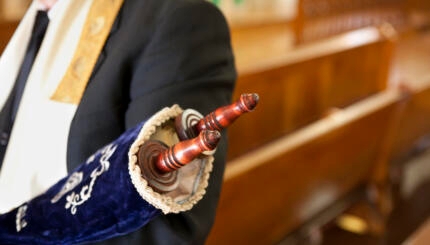Today’s guest post comes from Bob M. Schwartz, a member of Temple B’nai Israel in Tupelo, Mississippi. His thoughts can be found at bobmschwartz.com as well.
On April 28, 2014, a tornado cut a path of destruction through Tupelo, Mississippi. Many buildings were damaged and destroyed. Houses of worship were no exception.
A tree punctured the roof of Temple B’nai Israel. A few blocks away, St. Luke United Methodist Church was hit much worse. Thanks to an outdoor security camera, the world has seen dramatic video of the church playground being blown away. The tornado also tore off the roof of the church’s sanctuary.
B’nai Israel missed only one Shabbat service for repairs. At St. Luke, Sunday services for the 800-member congregation were held in the Family Life Center. But many classes and groups had to look for temporary homes elsewhere.
St. Luke Methodist ChurchThat’s where the story of friendship begins- or really, where it continues.
B’nai Israel has been an integral part of the Tupelo community since 1939. It is the center of Jewish life for a broad region stretching all the way into Alabama. When the current building was dedicated in 1957, it was a development supported and celebrated by institutions across northeast Mississippi, including many of the local churches.
Openness has marked the relationship between B’nai Israel and the churches that surround it. So it was natural that when St. Luke Church needed a place for its Sunday School, it would come calling at B’nai Israel. But there is much more to this story than just a convenient location.
Bettye Coggin of St. Luke Church is the primary teacher of what is called the Friendship Sunday School. It is an adult education class that includes about sixty congregants, mostly in their sixties, seventies, and eighties. Three of the couples are “charter members,” having been in the class for fifty-two years. That is where the “Friendship” name came from.
In this case, that was not the only friendship that mattered.
George Copen is a past President and current Board member at B’nai Israel. His family came to Tupelo in 1954, where his parents Reuben and Dorothy Copen played a major role in the growth of the congregation. George attended school in Tupelo, and it was there in 8th grade that he first met Bettye Coggin.
Len Shane, President of the Temple, presents key to Bettye Coggin, Sunday School leader of the ChurchContinuity has been until recently a hallmark of Southern life and Southern Jewish life. And even with the increased mobility of the last few decades, Tupelo and other Southern sites still seem to have a hold on the people born or raised there. So maybe it is no surprise after decades that Bettye Coggin and George Copen should still be in Tupelo, worshipping in buildings just a few blocks apart, serving leading roles with their congregations. They also continue to share the principle that in extreme circumstances they should get together to help serve their congregations and their faith.
There are differences in particular beliefs, of course. On the most fundamental of human concerns, though, those differences vanish in the face of need and service. Bettye Coggin points out that current curriculum for the Friendship Sunday School concerns the Old Testament, and studying that inside a Jewish synagogue adds a special dimension to the learning. While these particular lessons may not include Ecclesiastes, part of the biblical Ketuvim (Writings), that book has something appropriate to say:
“Two are better than one because they have a good reward for their labor. For if they fall, the one will lift up his fellow; but woe to him that is alone when he falls, for he has not another to help him up.” (Ecclesiastes 4:9-10).
Like this post? Join the conversation through MyJewishLearning’s weekly blogs newsletter.
Shabbat
Pronounced: shuh-BAHT or shah-BAHT, Origin: Hebrew, the Sabbath, from sundown Friday to sundown Saturday.



